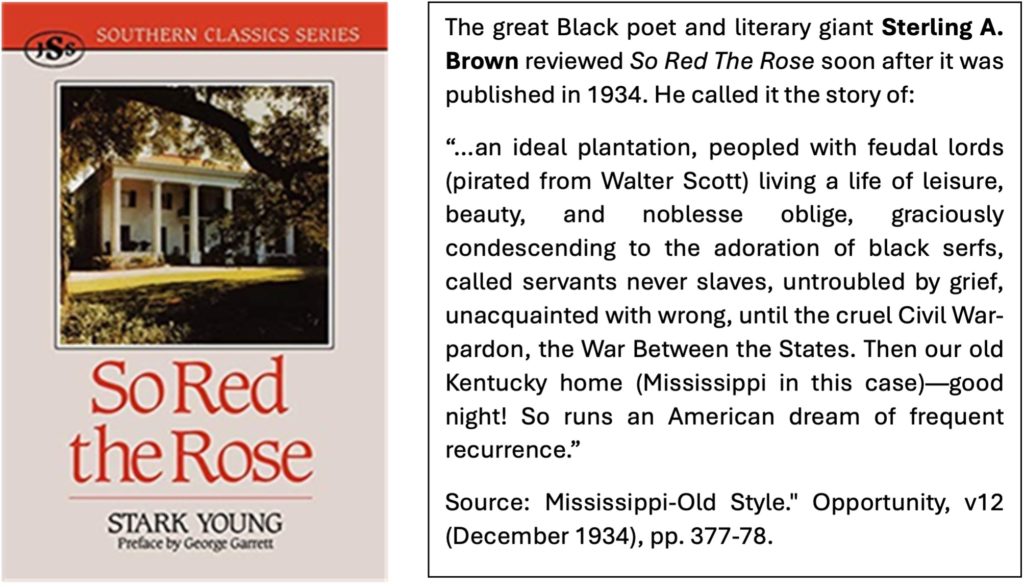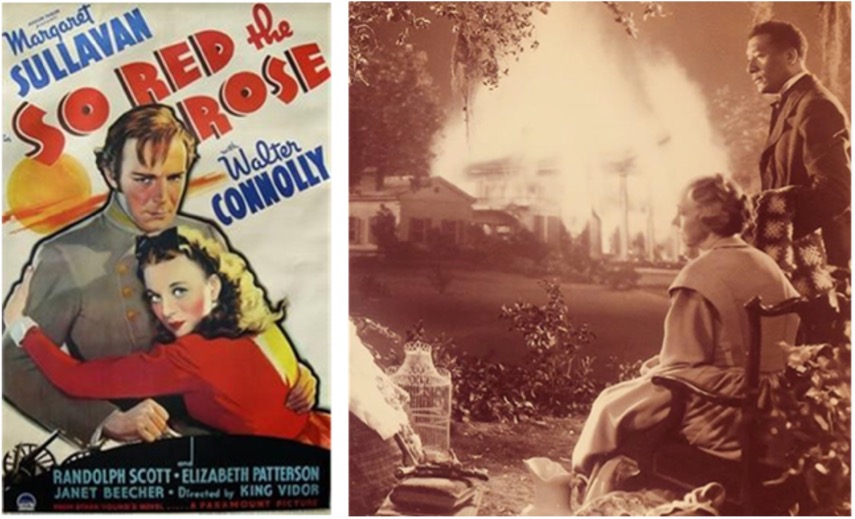So Red the Rose is a novel written in 1934 by Stark Young who was born in Como, Mississippi. Young was the grandson of Hugh McGehee, the brother of Judge Edward McGehee of Bowling Green Plantation near Woodville, Wilkinson County, Mississippi. Though the book is a fictional account of the wealthy slaveholding families in the Natchez region, it closely mimics the McGehees of Wilkinson County and the events surrounding the U.S. Third Colored Cavalry’s burning of Bowling Green Plantation during the Civil War. In 1935, the book was adapted into a full-length movie also titled So Red The Rose.

Stark Young uses the names of real places, real events, and real people in the novel. One of the characters is William Veal, who is depicted as a loyal mulatto family “servant,” mentioned 28 times in the book and is prominently featured in the film. In ongoing reviews of the book, and the film, the name William Veal has been continually battered about in describing the relationship between enslaved people and their slaveowners.
The William Veal in So Red the Rose is a fictional character, a house servant who lived on the fictional Montrose Plantation with the McGehee family. The creation of William Veal perpetuates false narratives for the “old style” South.
i) That slaveowners were kind and benevolent to the people they enslaved, and these slaves in turn really loved them, especially the house servants.
ii) That the field slaves were ungrateful for the life provided them by their owners and ran away to join the Union Army where they were mistreated.

Why do I care about So Red The Rose?
There was a real person in Wilkinson County, Mississippi, named William Veal. A real person with a wife, children, extended family, and a community of descendants. What we know about him has been created by the descendants of his slaveowners. Not much has been told or written about William Veal by his descendants. What is his story?
Next: The Real William Veal

My take on this blog is that these types of depictions of slavery are put forth in an attempt to deodorize what is really happening on these plantations. I don’t believe a word of what I’ve
read, and because of the slant of the story I won’t be reading or watching this story.
Albert thanks for your comments. Reviews of these books and films are hard to watch but they are not going away. The goal is to challenge the existing narratives and then tell our story.
Can ya see what the Enslaved Ancestors are doing through us that are dedicated to rescuing their humanity and stories?
This is no coincidence that this information has risen from cellars of unforgotten to be featured and testament at this time, (this time we are bringing the 3rd U. S. Colored Cavalry back to Mississippi and Natchez to publicly tell the story truth) after the folks around the Old Old Natchez District, especially in Wilkinson County have then and now kept truth hidden in their tourism narrative!
Thank you for keeping alive and again bringing the Third U.S. Colored Re-enactors from Florida to Mississippi (Vicksburg and Natchez) June 7-13, 2024. The always victorious Third U.S. Colored Cavalry was key to securing the Mississippi Valley after the fall of Vicksburg and in the Battle of Woodville, which included the burning of Bowling Green Plantation.
I look forward to reading his real life. I’m sure it’s very different from the fictional version.
Thanks Kristin. Yes, the fictional version only portrays a one-dimensional loyal servant. His real story has all the human elements – parents, wife, children, family, and community.
Though fictional, I ‘m definitely interested in this fictional account of the Judge McGhee family and Wilkerson County. I’ve been involved a while now searching my paternal family’s history. I am familiar with the McGhee Plantation. I’ve visited several times. That’s Alvin for this information and the resource. I’m searching library resources now trying to locate the title.
Thanks Jackie. This novel and film preceded Gone With the Wind and has many similarities. The storyline of the film is adapted from the book, but not the same. I have watched the film several times.
Well, we all know the slave masters were very cruel and treated our ancestors inhumane. The decendants of Mr. William Veal should pursue compensation for the use of his name from the novel and the film. I think I’ll watch it because the film may very well depict my family or factually events that can be proven to be true, not fictional.
Thanks Jackie. The storyline of the film is adapted from the book, but they are not the same. I have watched the film several times.
My name is Ruffin Veal lll. I’m looking forward to the narrative on The Real William Veal. My genealogy research has uncovered many of the facts presented so far. However, I have run into difficulty in tracing my particular lineage of the Veal family. Keep the info coming your efforts are appreciated.
Thanks for commenting.
This is interesting, Alvin. Thanks.
Thanks.
Cliffhanger? Love it!
I was reminded of the show. “To Tell the Truth,” when I read your blog. You don’t just talk-the-talk. You walk-the-walk. Thank you for putting pen to pad and sharing valuable history from the family’s voice.
Thanks Vernita.